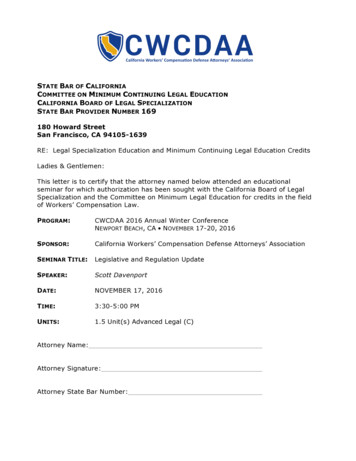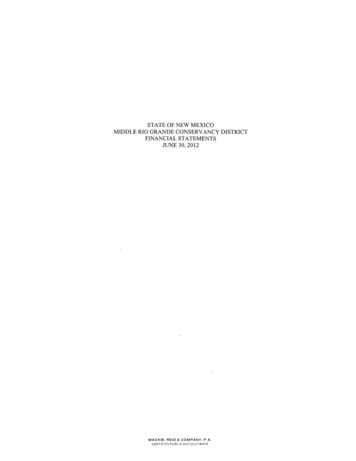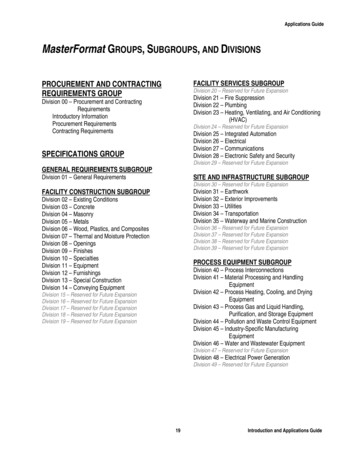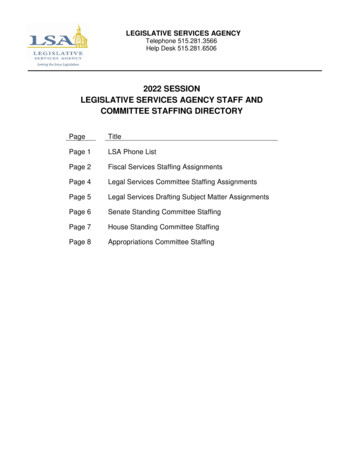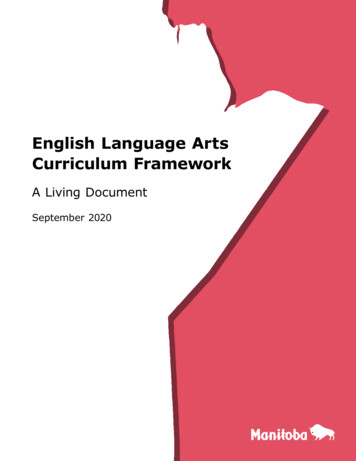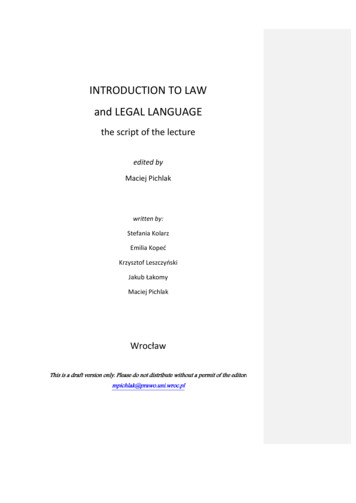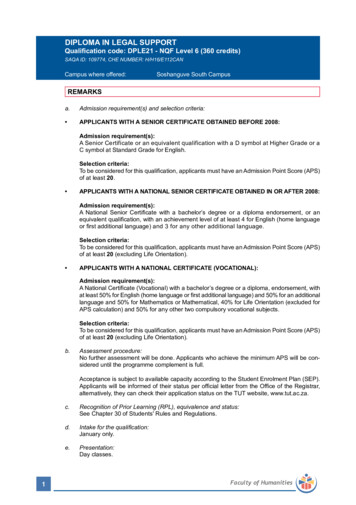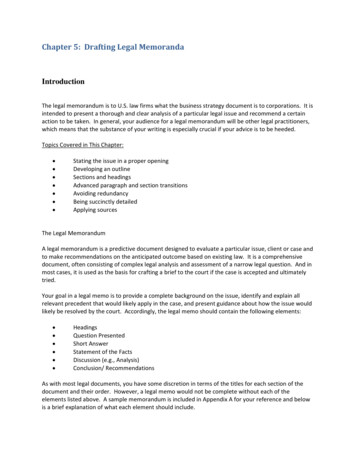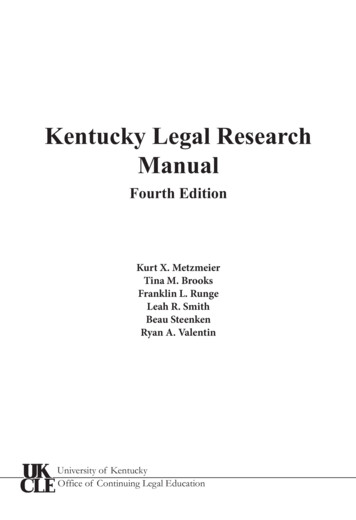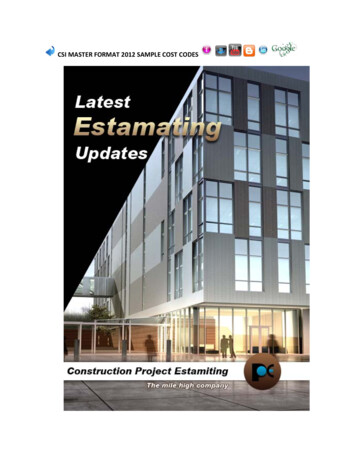
Transcription
TITLE 2. RIGHTS AND RESPONSIBILITIES OF LICENSEESAdopted July 2007DIVISION 4. MINIMUM CONTINUING LEGAL EDUCATIONChapter 1. Purpose and scopeRule 2.50 Purpose of MCLERules for Minimum Continuing Legal Education (MCLE) require active licensees of the State Barof California to remain current regarding the law, the obligations and standards of the legalprofession, and the management of their practices. A licensee’s involuntary enrollment asinactive for failing to comply with these rules is public information available on the State BarWeb site.Rule 2.50 adopted effective January 1, 2008; amended effective January 25, 2019.Rule 2.51 Definitions(A)An “MCLE activity” is continuing legal education that the State Bar approves as meetingstandards for MCLE credit.(B)A “provider” is an individual or entity approved by the State Bar to grant MCLE credit foran MCLE activity.(C)“MCLE credit” is the number of credit hours that a licensee may claim to meet therequirements of these rules.(D)A “credit hour” is sixty minutes actually spent in an MCLE activity, less any time forbreaks or other activities that lack educational content. A credit hour is reported to thenearest quarter hour in decimals.(E)An “approved jurisdiction” is recognized by the State Bar as having MCLE requirementsthat substantially meet State Bar standards for MCLE activities and computing MCLEcredit hours in a manner acceptable to the State Bar. Approved jurisdictions are listedon the State Bar Web site.(F)A “participatory activity” is an MCLE activity for which the provider must verifyattendance. Participatory activities may be presented in person or delivered byelectronic means. Methods for verification include sign-in writing or electronically at thestart of the course.1 of 11
(G)A “self‐study activity” is any MCLE activity identified in Rule 2.83. Self‐study activitiesmay be presented in person or delivered by electronic means.(H)State Bar New Attorney Training is MCLE that is developed and made available directlyfrom the State Bar and is focused on law practice competency for newly admittedlicensees.Rule 2.51 adopted effective January 1, 2008; amended effective July 1, 2014; amended effective February 1, 2018;amended effective January 25, 2019; amended effective December 1, 2020.Rule 2.52 MCLE ActivitiesTo receive MCLE credit, a licensee must complete an MCLE activity that meets State Barstandards.(A)The MCLE activity must relate to legal subjects directly relevant to licensees of the StateBar or have significant current professional and practical content.(B)The presenter of the MCLE activity must have significant professional or academicexperience related to its content.(C)Promotional material must state that the MCLE activity is approved for MCLE credit orthat a request for approval is pending; specify the amount of credit offered; and indicatewhether any of the credit may be claimed for required MCLE in legal ethics, eliminationof bias, or competence issues.(D)If the activity lasts one hour or more, the provider must make substantive writtenmaterials relevant to the MCLE activity available either before or during every MCLEactivity. Any materials provided online must remain online for at least thirty calendardays following the MCLE activity.(E)Programs and classes must be scheduled so that participants are free of interruptions.(F)On and after January 1, 2022, for all training dealing with, or including a componentdealing with, implicit bias and the promotion of bias-reducing strategies, the MCLEprovider must meet the requirements of Business and Professions Code section 6070.5.Rule 2.52 adopted effective January 1, 2008; amended effective January 1, 2013; amended effectiveJuly 1, 2014; amended effective January 25, 2019; amended effective September 24, 2020.Rule 2.53 New licensees(A)A new licensee is permanently assigned to a compliance group on the date of admission.2 of 11
(B)The initial compliance period for a new licensee begins on the first day of the month inwhich the licensee was admitted. It ends when the period ends for the compliancegroup. If the initial period is less than the period for the compliance group, the requiredcredit hours may be reduced as provided in these rules.1(C)A new licensee may not claim credit for education taken before the initial complianceperiod.(D)A new licensee is required to complete a State Bar New Attorney Training program duringthe first year of admission. New licensees who have completed any portion of the NewAttorney Training program while enrolled in the State Bar’s Provisional LicensureProgram2are deemed to have satisfied that portion of the requirement and, therefore, do not have toretake that portion of the New Attorney Training program.(E)New licensees can also apply New Attorney Training hours to their regular MCLErequirement, provided that the hours are completed within the licensee’s MCLE complianceperiod.Rule 2.53 adopted effective January 1, 2008; amended effective February 1, 2018; amended effective January 25,2019; amended effective May 13, 2021.Rule 2.54 Exemptions(A)(B)The following active licensees are exempt from MCLE requirements, provided they claimthe exemption in their assigned compliance periods using My State Bar Profile online oran MCLE Compliance Form:(1)officers and elected officials of the State of California;(2)full-time professors at law schools accredited by the State Bar of California or theAmerican Bar Association;(3)those employed full-time by the State of California on a permanent orprobationary basis, regardless of their working hours, who do not otherwisepractice law; and(4)those employed full-time by the United States government on a permanent orprobationary basis, regardless of their working hours, who do not otherwisepractice law.Licensees whom this rule exempts by reason of their employment with the State ofCalifornia or the United States government may provide pro bono legal services through a1Rule 2.72 (C).2California Rule of Court, Rule 9.493 of 11
California qualified legal services project or a qualified support center3, or through a legalservices project or support center that primarily provides legal services without charge toindigent persons in another jurisdiction and is funded by the Legal Services Corporation orthe Older Americans Act or receives funding administered by the jurisdiction’s interest onlawyers trust accounts program.Rule 2.54 adopted effective January 1, 2008; amended effective February 23, 2017; amended effective January 25,2019.Rule 2.55 ModificationsA licensee prevented from fulfilling the MCLE requirement for a substantial part of acompliance period because of a physical or mental condition, natural disaster, familyemergency, financial hardship, or other good cause may apply for modification of MCLEcompliance requirements. The State Bar must approve any modification.Rule 2.55 adopted effective January 1, 2008; amended effective January 25, 2019.Chapter 2. ComplianceRule 2.70 Compliance groupsA licensee is permanently assigned to one of three compliance groups on the basis of the firstletter of the licensee’s last name at the date of admission.4 The three groups are A-G, H-M, andN-Z. The licensee remains in the compliance group despite any subsequent change of lastname.Rule 2.70 adopted effective January 1, 2008; amended effective January 25, 2019.Rule 2.71 Compliance periods(A)3A compliance period consists of thirty-six months. It begins on the first day of Februaryand ends three years later on the last day of January. The three compliance groupsbegin and end their compliance periods in different years. A licensee must report MCLEcompliance no later than the day following the end of the compliance period. The reportmust be made online using My State Bar Profile or with an MCLE Compliance Form. Feesfor noncompliance are set forth in the Schedule of Charges and Deadlines.Business & Professions Code § 6213.4A historical exception exists. When the MCLE program was established in 1992, licensees were permanentlyassigned to compliance groups on the basis of their last names at the time, regardless of any different last namesthey might have used previously.4 of 11
(B)Compliance with State Bar New Attorney Training must be effectuated and reportedcompleted, in a manner established by the State Bar, by the last day of the month of anattorney’s one-year anniversary as a State Bar licensee. Fees for noncompliance are setforth in the Schedule of Charges and Deadlines.Rule 2.71 adopted effective January 1, 2008; amended effective February 1, 2018; amended effective January 25,2019; amended effective September 24, 2020.Rule 2.72 Requirements(A)Until December 31, 2021, all licensees shall be subject to the following:(1)Unless these rules indicate otherwise, a licensee who has been activethroughout a thirty-six-month compliance period must complete twenty-fivecredit hours of MCLE activities. No more than twelve and a half credit hours maybe self-study.5 Total hours must include no less than 6 hours as follows:(a)at least four hours of legal ethics;(b)at least one hour dealing with the recognition and elimination of bias inthe legal profession and society by reason of, but not limited to, sex,color, race, religion, ancestry, national origin, physical disability, age, orsexual orientation; and(c)at least one hour of education addressing substance abuse or othermental or physical issues that impair a licensee’s ability to perform legalservices with competence.(2)Required education in legal ethics, elimination of bias, or competence issues maybe a component of an approved MCLE activity that deals with another topic.(3)A licensee may reduce the required twenty-five hours in proportion to thenumber of full months the licensee was inactive or exempt in the thirty-sixmonth compliance period. Up to half the reduced hours may be self-study.6 Atool for applying this formula is available at the State Bar Web site.(4)Excess credit hours may not be applied to the next compliance period.75Rule 2.83.6Rule 2.83.7But see Rule 2.93.5 of 11
(B)On and after January 1, 2022, all licensees shall be subject to the following:(1)Licensees reporting for the compliance periods ending January 31, 2022, shall besubject to the requirements set forth in paragraphs (A)(1), (A)(2), (A)(3), and(A)(4) for the compliance period ending January 31, 2022.(2)Beginning with the compliance period ending January 31, 2023, all licensees shallcomply with the following:(a)Unless these rules indicate otherwise, a licensee who has been activethroughout a thirty-six-month compliance period must complete twentyfive credit hours of MCLE activities. No more than twelve and a half credithours may be self-study.8 Total hours must include no less than 7 hoursas follows:(i)at least four hours of legal ethics;(ii)at least two hours dealing with the recognition and elimination ofbias in the legal profession and society by reason of, but notlimited to, sex, color, rage, religion, ancestry, national origin,physical disability, age, or sexual orientation;1.(iii)8Of those two hours, at least one hour must focus onimplicit bias and the promotion of bias-reducing strategiesto address how unintended biases regarding race,ethnicity, gender identity, sexual orientation,socioeconomic status, or other characteristics undermineconfidence in the legal system; andat least one hour of education addressing substance abuse orother mental or physical issues that impair a licensee’s ability toperform legal services with competence.(b)Required education in legal ethics, elimination of bias, or competenceissues may be a component of an approved MCLE activity that deals withanother topic, consistent with the requirements of Rule 2.52(F).(c)A licensee may reduce the required twenty-five hours in proportion tothe number of full months the licensee was inactive or exempt in thethirty-six-month compliance period, except that the requirements ofparagraphs (B)(2)(a)(ii) and (B)(2)(a)(iii) may not be reduced to less thanRule 2.83.6 of 11
one hour each. Up to half the reduced hours may be self-study.9 A toolfor applying this formula is available at the State Bar website.(d)Excess credit hours may not be applied to the next compliance period.10Rule 2.72 adopted effective January 1, 2008; amended effective July 1, 2014; amended effective January 25,2019; amended effective September 24, 2020.Rule 2.73 Record of MCLEFor a year after reporting MCLE compliance, a licensee must retain and provide upon demandand to the satisfaction of the State Bar(A)a provider’s certificate of attendance;(B)a record of self-study that includes the title, provider, credit hours, and date of eachMCLE activity; or(C)proof of exempt status.Rule 2.73 adopted effective January 1, 2008; amended effective July 1, 2014; amended effective January 25, 2019.Chapter 3. MCLE Activities approved for MCLE creditRule 2.80 Attending programs and classesA licensee may claim MCLE credit for attending a MCLE activity, such as a lecture, paneldiscussion, or law school class, in person or by technological means.Rule 2.80 adopted effective January 1, 2008; amended effective January 25, 2019.Rule 2.81 SpeakingA licensee may claim participatory MCLE credit for speaking at an approved MCLE activity.(A)A principal speaker, who is responsible for preparing and delivering a program or classand its related materials, may claim(1)actual speaking time multiplied by four for the first presentation; or(2)actual speaking time only for each time a presentation is repeated withoutsignificant change.9Rule 2.83.10But see Rule 2.93.7 of 11
(B)A panelist may claim(1)(2)(C)either of the following for the first panel presentation:(a)scheduled individual speaking time multiplied by four, plus the actualtime spent in attendance at the remainder of the presentation; or(b)when times have not been scheduled for individual speakers, an equalshare of the total time for all speakers multiplied by four plus the actualtime spent in attendance at the remainder of the presentation.actual speaking time only for each time a presentation is repeated withoutsignificant change.A licensee who introduces speakers or serves as a moderator may claim only the MCLEcredit available to any attendee.Rule 2.81 adopted effective January 1, 2008; amended effective July 1, 2014; amended effective January 25, 2019.Rule 2.82 TeachingA licensee may claim participatory MCLE credit for teaching a law school course.(A)A licensee assigned to teach a course may claim no more than the credit hours grantedby the law school multiplied by twelve or actual speaking time for required MCLE inlegal ethics, elimination of bias, or competence issues.(B)A guest lecturer or substitute teacher may claim(1)actual speaking time multiplied by four for the first presentation; or(2)actual speaking time only for each time a presentation is repeated withoutsignificant change.Rule 2.82 adopted effective January 1, 2008; amended effective July 1, 2014; amended effective January 25, 2019.Rule 2.83 Self-studyA licensee may claim up to half the credit hours required in a compliance period for(A)completing MCLE activities for which attendance is not verified by a provider and theMCLE activities were prepared within the preceding five years;8 of 11
(B)taking an open- or closed-book self-test and submitting it to a provider who returns itwith a grade and explanations of correct answers; or(C)authoring or co-authoring written materials that(1)have contributed to the licensee’s legal education;(2)have been published or accepted for publication; and(3)were not prepared in the ordinary course of employment or in connection withan oral presentation at an approved MCLE activity.Rule 2.83 adopted effective January 1, 2008; amended effective July 1, 2014; amended effective January 25, 2019.Rule 2.84 Legal specializationA licensee may claim MCLE credit for educational activities that the California Board of LegalSpecialization approves for certification or recertification.Rule 2.84 adopted effective January 1, 2008; amended effective July 1, 2014; amended effective January 25, 2019.Rule 2.85 Education taken while physically out of state(A)A licensee may claim MCLE credit for an MCLE activity authorized by an approvedjurisdiction if it meets the requirements of these rules and if the licensee attends ordoes the MCLE activity outside California. A licensee may not claim credit for such anactivity, including self-study, when physically present in California unless the State Barhas specifically approved it.(B)A licensee who qualifies for an MCLE activity authorized by an approved jurisdiction mayclaim the amount of credit authorized by the jurisdiction. No special procedure isrequired to claim the credit.Rule 2.85 adopted effective January 1, 2008; amended effective July 1, 2014; amended effective January 25, 2019.Rule 2.86 Licensee credit requestA licensee may apply for MCLE credit for an educational activity directly relevant to thelicensee’s practice but not otherwise approved if the activity substantially meets State Barstandards. The application must be submitted with the appropriate fee.Rule 2.86 adopted effective January 1, 2008; amended effective July 1, 2014; amended effective January 25, 2019.9 of 11
Rule 2.87 Bar examinations and MPREA licensee may not claim MCLE credit for preparing for or taking a bar examination or theMultistate Professional Responsibility Examination (MPRE).Rule 2.87 adopted effective January 1, 2008; amended effective January 25, 2019.Chapter 4. NoncomplianceRule 2.90 DefinitionNoncompliance is failure to(A)complete the required education during the compliance period or an extension of it;(B)report compliance or claim exemption from MCLE requirements;(C)keep a record of MCLE compliance11; or(D)pay fees for noncompliance.Rule 2.90 adopted effective January 1, 2008.Rule 2.91 Notice of noncompliance(A)A licensee who is sent a notice of noncompliance must comply with its terms or beinvoluntarily enrolled as inactive. An inactive licensee is not eligible to practice law.(B)If the notice requires the licensee to complete credit hours for the previous complianceperiod, any excess credit hours may be counted toward the current compliance period.Rule 2.91 adopted effective January 1, 2008; amended effective January 25, 2019.Rule 2.92 Enrollment as inactive for MCLE noncomplianceA licensee who fails to comply with a notice of noncompliance is enrolled as inactive and is noteligible to practice law. The enrollment is administrative and no hearing is required.Rule 2.92 adopted effective January 1, 2008; amended effective January 25, 2019.11Rule 2.73.10 of 11
Rule 2.93 Reinstatement following MCLE noncomplianceEnrollment as inactive for MCLE noncompliance terminates when a licensee submits proof ofcompliance and pays noncompliance fees. Credit hours that exceed those required forcompliance may be counted toward the current period.Rule 2.93 adopted effective January 1, 2008; amended effective January 25, 2019.11 of 11
(A) An "MCLE activity" is continuing legal education that the State Bar approves as meeting standards for MCLE credit. (B) A "provider" is an individual or entity approved by the State Bar to grant MCLE credit for an MCLE activity. (C) "MCLE credit" is the number of credit hours that a licensee may claim to meet the
